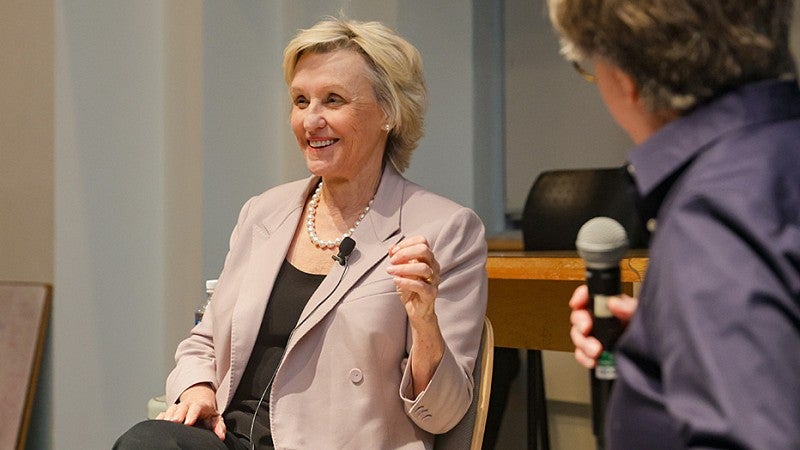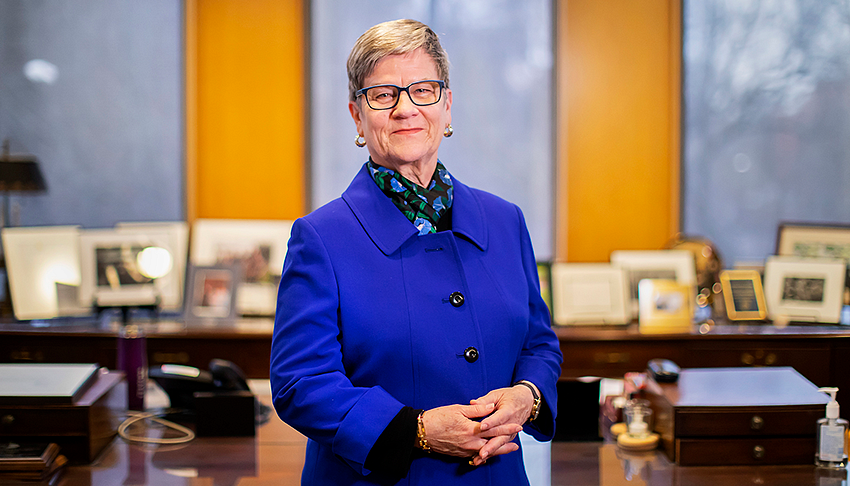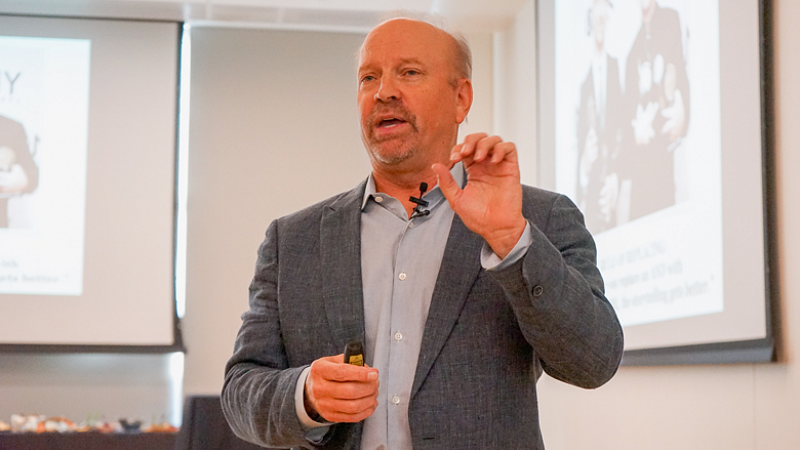The annual Johnston Lecture brings professionals to the SOJC for thought-provoking lectures, workshops, and discussions about the thorny issues today’s journalists face. Laurie Johnston ’36, an award-winning New York Times writer, established the series in memory of her husband Richard Johnston ’36, founding executive editor of Sports Illustrated. The series is made possible by generous gifts from the Johnston family, George E. Jones of U.S. News and World Report, and the Correspondents Fund.
2024 Johnston Lecture: “From Editor to CEO: Tina Brown's Legendary Career”

A trendsetter in one of the most disrupted industries of our time, Tina Brown has exemplified dynamic leadership in the news media industry while blazing trails as a female leader at a time when media was a man's domain. As the 2024 Johnston lecturer, Brown shared her journey as editor-in-chief of Vanity Fair and The New Yorker as well as founder of The Daily Beast and the global Women in the World Summit—from overcoming challenges facing female leaders and radical reinvention in the face of shifting tastes and technologies, to improving the lives of women and girls. This lecture was co-sponsored by the Center for the Study of Women in Society as part of its 50th Anniversary: Celebrating Feminist Futures.
2023 Johnston Lecture: “Climate Action as a Powerful Prescription to Improve Health and Equity” with Dr. Renee Salas
Dr. Renee Salas, MD, MPH, MS, has a prescription to limit the impacts of climate change on our most vulnerable populations. The internationally recognized climate change and health expert gave audience members a deeper understanding of the health impacts of climate change and what they can do to make a difference. “We cannot achieve health equity without climate action,” said Salas, a practicing physician and lecturer for Harvard Global Health Institute, Emergency Medical Physical, Mass Gen Hospital, and Harvard Medical School. The lecture was sponsored by the Center for Science Communication Research and co-sponsored by the Phil and Penny Knight Campus for Accelerating Scientific Impact, the UO Environment Initiative, and the Center for Latino/a and Latin American Studies.
2022 Johnston Lecture: “Storytelling and Culturally Relevant Science Communication” with Dr. Mónica Feliú-Mójer
Dr. Mónica Feliú-Mójer—a bilingual scientist-turned-communicator who engages historically underserved and overlooked audiences with science—gave in-depth examples of how applying a cultural lens to science communication and storytelling can make science more equitable, inclusive, and effective. Dr. Feliú-Mójer serves as director of communications and science outreach for Ciencia Puerto Rico, a nonprofit and global community of more than 13,000 scientists, students, educators, and allies creating social impact in Puerto Rico. The event was co-sponsored by the SOJC’s Center for Science Communication Research (SCR), the Phil and Penny Knight Campus for Accelerating Scientific Impact, Just Futures Institute, and the Center for Latino/a & Latin American Studies.
2021 Johnston Lecture: “The Challenges of COVID-19 Communication” with Dr. Kathleen Hall Jamieson

In her virtual talk, "Overcoming the Challenges of Communicating Emerging Science about COVID-19", acclaimed author and science communication expert Dr. Kathleen Hall Jamieson spoke about the challenges of communicating about COVID-19 and ways to inform the press and public about the nature of emerging science in polarized times. Dr. Hall Jamieson is the author of 16 books as well as co-founder of FactCheck.org and its subsidiary site, SciCheck, which monitors political speech for the misuse of science. The event was co-sponsored by the SOJC’s Center for Science Communication Research (SCR), the Phil and Penny Knight Campus for Accelerating Scientific Impact, and the Wayne Morse Center for Law and Politics.
2019 Johnston Lecture: “Lost Earth” with Randy Olson

In his talk, “Lost Earth: How Science Failed to Communicate the Biggest Crisis,” marine biologist-turned-filmmaker Randy Olson zeroed in on the role of poor communication in today’s climate crisis. Olson, the author of three books on the communication of science, detailed the scientific community’s failure to clearly present its research findings to the public over the past four decades and offered communication-based solutions. The event was co-sponsored by the SOJC’s Center for Science Communication Research (SCR) and the Phil and Penny Knight Campus for Accelerating Scientific Impact.
2018 Johnston Lecture: “Our Anthropocene Conundrum” with Dennis Dimick
Dennis Dimick, former picture and environment editor for National Geographic, delivered a narrated visual journey through the Anthropocene—the past three centuries of human activity culminating in our fossil-fueled modern world. Presented by the SOJC’s Center for Science Communication Research (SCR), Dimick's talk makes a case that, while humans have created great prosperity on Earth, it's at a cost we must now reckon with. As we approach a turning point, communicators can help convince policy makers and the public that we must make an energy transition before it’s too late.
Past Johnston Lecturers
- 2017: Ted Conover, author and journalist
- 2016: John Markoff (MA ’76), senior writer for the New York Times
- 2015: Ken Doctor (MA ’79), news industry analyst, Newsonomics
- 2013: Charles Jaco, journalist, Fox 2 News; radio host, KMOX
- 2012: Alex Kotlowitz, author, Bearing Witness: Storytelling and Human Rights
- 2011: Jonathon Gold, author, Experts in the Age of Citizen Journalism
- 2010: Andrew Revkin, environmental writer and blogger, the New York Times
- 2009: Tony Horwitz, author of five books, including A Voyage Long and Strange
- 2008: Peggy Orenstein, contributing writer, the New York Times; author, Flux: Women on Sex, Work, Love, Kids and Life in a Half-Changed World, Waiting for Daisy, and Schoolgirls
- 2007: Adrian Nicole LeBlanc, 2006 MacArthur Fellow; author of Random Family: Love, Drugs, Trouble, and Coming of Age in the Bronx
- 2006: Benoit Denizet-Lewis, contributing writer, The New York Times Magazine
- 2005: Erik Larson, author, Isaac’s Storm
- 2004: Melissa Fay Greene, author, Last Man Out and The Temple Bombing
- 2003: Terry Tempest Williams, author, Refuge: An Unnatural History of Family and Place and Red: Passion and Patience in the Desert
- 2002: Edward Humes, Pulitzer Prize–winning journalist and author, No Matter How Loud I Shout and Baby ER
- 2001: Susan Orlean, contributing writer, the New Yorker; author, The Orchid Thief and The Bullfighter Checks Her Makeup: My Encounters with Extraordinary People
- 2000: Alex Kotlowitz, author, There Are No Children Here and The Other Side of the River
- 1999: Peter Matthiessen, author, The Snow Leopard, In the Spirit of Crazy Horse, and Zen Journals
- 1998: Randall Rothenberg, former contributing editor, Esquire; author, Where the Suckers Moon
- 1997: Barbara Ehrenreich, columnist, TIME magazine; author, The Snarling Citizen
- 1996: James Fallows, The Atlantic Monthly
- 1995: Victor Navasky, The Nation
- 1993: Robin Morgan, Ms. magazine
- 1991: Ambassador “Bill” Lane Jr., Sunset magazine
- 1990: David Haupert, Magazine Group of Meredith Corporation
- 1990: Jack Fincher, Reader’s Digest, Smithsonian
- 1988: Suzanne Braun Levine, former editor and vice president, Ms. magazine
- 1987: Richard Stolley, former editor, Life magazine
- 1986: Harold Hayes, former editor, Esquire
- 1984: Ray Cave, TIME magazine
